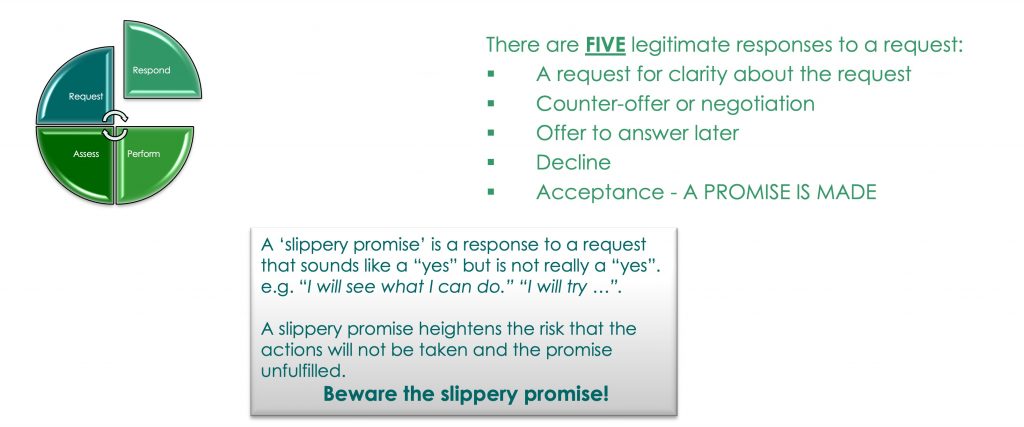
A request is made in the expectation that a promise will follow leading to effective action to address a breakdown. A promise is a declaration of commitment to action.
When asked to do something, there are FIVE legitimate responses, however only one, a clear declaration of acceptance of the request creates a promise. This takes the form of “yes” or “I can do that for you” or a similar clear declaration.
The five responses are:
| 1. Request for greater clarity | If the listener is unclear about what is being requested, then it is appropriate to ask for greater clarity before considering whether to accept. “I am unclear what you are asking me to do. Can you please explain it further?” |
| 2. Counter-offer | Seek to negotiate the request so any commitment will work for both parties. To do this well, it is important to have a sense of current priorities to be able to judge the importance of the request compared to other commitments and personal goals. “I cannot do X by time Y but I could do it by time Z, does that work for you?” |
| 3. Offer to answer later | Occasionally, the listener may need to determine whether they are able to fulfil the request before responding. In such cases, the listener may offer to respond to the request at a specific time. “I cannot give you and answer now. I can let you know by time Y.” |
| 4. Decline | A decline, which should always be an acceptable response in the context of the rights of others to make their own choices. It is important to understand that declining a request may have an impact, and sometimes a significant impact, on a relationship with others or on an individual’s identity or that of the group. It may also result in penalties. This is particularly relevant where there are major differences in the assessments of authority between the speaker and the listener. Depending on the importance of the relationship, it is generally appropriate to provide a reason for declining. “I’m sorry but I cannot do that because of reason X.” |
| 5. Acceptance (Promise) | Acceptance is a declaration that a promise is made. “I will do as you ask.” |
How we respond to requests is born of our self-story but also impacts our identity with those involved and our ongoing self-story.
An inability to decline often speaks to an assessment of little authority and a negative self-story.
Believing we cannot decline or negotiate a request often leads to feeling overwhelmed and an inability to fulfil all our commitments, and we suffer accordingly. A key element of trust is reliability – how well a person manages and delivers on their promises. By accepting every request made of us, we are unlikely to keep all those promises thereby diminishing trust and damaging the relationship. Given that everyone lives in a network of promises, not only will our immediate relationship suffer, our identity with others may also suffer as the impact if our non-delivery ripples outwards.
When responding to requests, it is important to consider what we are taking on and how that fits with our other commitments. This is where an offer to answer later or counter-offer play an important role. Many people feel pressured to respond to a significant request immediately and this can lead to overcommitment. An offer to answer later allows some space in which to consider how we might actually fulfil the request in the desired timeframe.
A counter-offer requires an appreciation of our priorities at that time. This is where a daily practice of priority setting proves valuable as we can use it as a means of assessing how a request fits into our other commitments. The idea of priority setting is expanded in the document, ‘Living a Constructive Life’.
Finally, how often do you hear someone respond to a request with “I’ll see if I can fit that in” or “I will try to do that“? Although it is easy to listen to such responses as an acceptance of a request, and indeed sometimes they are, such responses are generally a ‘slippery promise’. Although they may well be making a commitment, responding in this manner appears half-hearted. It might just be their way of saying “yes“, but it could also be they cannot bring themselves to decline.
Given a commitment to future action and outcomes always entail risk, a slippery promise is an indicator of a heightened risk of non-fulfilment. If a request is addressing an important concern then it may well be prudent to constructively challenge a slippery promise to gain clearer commitment.
This phase of an action conversation successfully ends with a clear declaration of acceptance whereby a promise is made.
